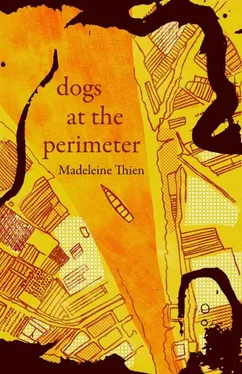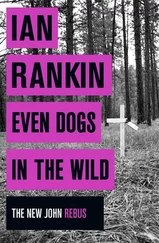“I know you,” he said. “I’ve always known you.”
I struggled to understand. I remembered a whiteness that came, debilitating, that I tried to remove from my body. One morning, Navin brought me a letter from Meng, who planned to travel back to Cambodia and wanted me to go with him. There were things, he said, that we needed to talk about, to end. Night after night I tried to bring back the ones I had left behind. In the mornings, when I opened my eyes, I saw only the bare walls. Everything, the good and the selfish, the loved and the feared, had taken refuge inside me. Thirty years later and still I remembered everything.
The telephone wakes me. The cat startles, tips sideways, and runs away. Her paws drum along the hardwood floors as I wave my hand into the darkness, closing my fingers around the receiver. Navin. Before I can say hello, the person on the other end, a woman’s voice, has begun speaking.
“Tavy,” I say, interrupting her, fighting my way out from under a net of sleep. Bit by bit, the room sharpens. I struggle for Khmer words. “What time is it there?”
A long pause and I’m suspended on the line. “I’m not sure. I’m at the office, at DC–Cam. Maybe four in the afternoon?”
Four in the morning, then, in Montreal.
“But, you see,” she says, “I’m returning your call. You left a message last night.”
I start to say it wasn’t urgent but Tavy continues, cutting me off firmly. “I found something. There are letters, beginning in 1975. We found six, all addressed to James Matsui.”
I fumble for the lights and end up knocking over a glass of water. “Tavy, wait. Letters from whom? From someone in Canada?”
“No,” she says. She slows down, realizing now that I was sound asleep. “A young woman. Cambodian. All this time, since 1996, these letters were in the archives. They were filed under her name. Sorya . But now we’re updating the database, right? Everything is going into the computer. More key words, anything to help us identify people. After I got your message, I re-did the search for James Matsui, but I found Sorya’s file instead. He had donated the letters.
“Listen,” she says. I hear movement, papers sorted through. Tavy begins to read, “ My darling James, today is the first day of the New Year. Heng came today and returned your camera …” She keeps going.
The water spreads in a puddle, touching my bare feet.
“She was his wife,” Tavy says. “Maybe Sorya is not her only name, probably she had an alias, many aliases. Nearly everyone did. I should look …”
“James wasn’t married. Or Hiroji never mentioned it.”
“But according to what she wrote …” Voices in the background, rising and falling. “She thought her letters were being smuggled to James,” Tavy says. Her voice is low, it mirrors my own surprise. “She took a risk and gave these letters to someone she trusted. Whoever it was, they told her that James Matsui was in hiding in the northeast, in the caves by the Cambodia — Laos border. Who knows if it was true? But in late 1975, she was arrested. I found her prison dossier — the usual, her biography, confessions, and also her photograph. There is nothing after 1976. But, also, there is no date of death.
“I’ll keep looking,” she says after a moment. “The letters are scanned so I can send them by email. I’m sorry I woke you … Usually when we find this kind of information, people like to know right away. One last thing, when James Matsui donated the letters, he left a phone number. I tried calling it but the number is out of service.”
“Thank you, Tavy,” I say.
“Yes,” she says. “I’ll keep looking.”
The dial tone hums in my ear. I hang up, step across the puddle of water, kneel down, and begin to wipe it with a T-shirt. The starlight is dim, a fine wash against the window. The water seems to keep on spreading. I give up on the puddle. On it goes, touching the feet of the couch, swelling against the carpet.
Unable to sleep, I go to Hiroji’s office and open the file.
Wednesday, February 22
[fragment]
This is the way Hiroji once described it to me. In 1976, Nuong arrived, alone, at the Aranyaprathet camp in Thailand. He had been ten years old when he and his brothers escaped from their cooperative, a mountain camp outside of Sisophon. The six boys had walked into the jungle and they had survived, on roots and stolen watermelons, for more than a month, finding their way west, toward Thailand. They scaled the Dangrek Mountains and descended into a dry, open forest. But then the mines separating Cambodia from Thailand, mines planted by the Khmer Rouge, began. The detonators were the size of melon seeds and the colour of rust, with trip wires, luminous nylon thread, that curled through the grass. The brothers walked single file, the eldest first, and Nuong last. Nuong saw only the black shirts of his brothers ahead of him. They whispered to him not to panic, not to be afraid. But leaving Cambodia was like trying to walk through a forest of glass. They set off a series of mines. Within seconds, all of his brothers were dead.
For a long time, he stood where he was. Bits of earth were everywhere around him, they fell in clumps from the trees, triggering yet more explosions. A deer leapt toward him, the ground burst. He stood with his hands pressed to his ears believing that he, too, had come apart. He saw his brothers again. They were impatient and they yelled at him to hurry, so Nuong closed his eyes and did as he was told. He began to crawl. Flies covered him. He was less than twenty metres from the border, he crossed without knowing it, and kept going until a Thai farmer saw him, reached down, and carried him away.
In 1980, Nuong was sponsored by a family in Lowell, Massachusetts, and he lifted off for America. For nearly two years, his letters arrived at Hiroji’s apartment every month, the upright alphabet giving way to cursive, to scribbled notes, and then to postcards. By the time Nuong was a teenager, even those no longer came. The boy had passed through a curtain, he belonged to a new family.
And then, last summer, Hiroji had answered the telephone and a voice he didn’t recognize, with an unfamiliar accent, said, “It’s me, Nick.”
“Nick?” Hiroji said. “I’m sorry. Who is this?”
“Nuong,” the voice said after a moment. “Nuong. From Aran camp.”
Hiroji was overjoyed. He asked a handful of questions but Nuong managed to evade them all. After a few minutes of dodging and deflecting, he told Hiroji that he was in trouble.
“What’s happened? Let me help you.”
But by then it was too late to intervene. Nuong had made too many mistakes, starting with the wrong friends, a quick temper, drinking, drugs, and finally a vicious fight that ended up blinding a man. Nuong and his adoptive family had not realized that, despite Nuong’s papers — his refugee status in the United States, his high school diploma, his green card — he was not an American citizen. He had neglected to apply. Instead, he was a refugee who had committed a felony and, now, under the law, he was subject to deportation. He was being sent back, forcibly, to Phnom Penh.
“We’ll get a lawyer,” Hiroji said.
“But I have one already.”
“I have a friend in Boston, don’t worry about money —”
“No,” Nuong said. “I just wanted to tell you. I wanted you to know that I was going back. That it was all for nothing.”
Hiroji was stunned silent.
“I don’t even speak Khmer anymore, I barely remember the language,” Nuong said. He laughed hurriedly, and then the discomfort came back. Hiroji saw the sullen Thai soldiers and the Khmer Rouge who had come like spiders across the border, taking truckloads of refugees. He saw the small boy who would sleep at the foot of his bed, motionless, unblinking.
Читать дальше












